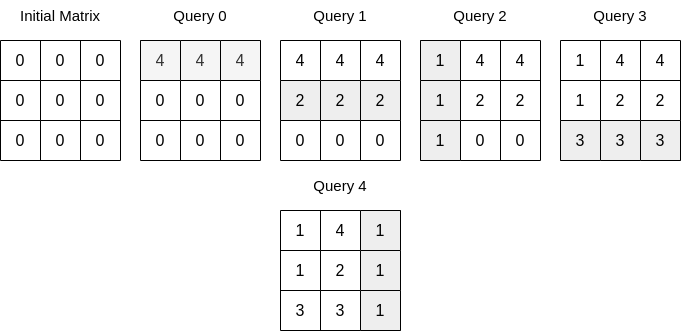Description
You are given an integer n and a 0-indexed 2D array queries where queries[i] = [typei, indexi, vali].
Initially, there is a 0-indexed n x n matrix filled with 0's. For each query, you must apply one of the following changes:
- if
typei == 0, set the values in the row withindexitovali, overwriting any previous values. - if
typei == 1, set the values in the column withindexitovali, overwriting any previous values.
Return the sum of integers in the matrix after all queries are applied.
Example 1:

Input: n = 3, queries = [[0,0,1],[1,2,2],[0,2,3],[1,0,4]] Output: 23 Explanation: The image above describes the matrix after each query. The sum of the matrix after all queries are applied is 23.
Example 2:

Input: n = 3, queries = [[0,0,4],[0,1,2],[1,0,1],[0,2,3],[1,2,1]] Output: 17 Explanation: The image above describes the matrix after each query. The sum of the matrix after all queries are applied is 17.
Constraints:
1 <= n <= 1041 <= queries.length <= 5 * 104queries[i].length == 30 <= typei <= 10 <= indexi < n0 <= vali <= 105
Solution
Python3
class Solution:
def matrixSumQueries(self, n: int, queries: List[List[int]]) -> int:
R = defaultdict(tuple)
C = defaultdict(tuple)
for index, (t, i, value) in enumerate(queries):
if t == 0:
R[i] = (index, value)
elif t == 1:
C[i] = (index, value)
combined = []
for k, (index, value) in R.items():
combined.append((index, 0, k, value))
for k, (index, value) in C.items():
combined.append((index, 1, k, value))
combined.sort(key = lambda x : -x[0])
rowCount = n
colCount = n
res = 0
for _, t, k, value in combined:
if t == 0:
res += value * rowCount
colCount -= 1
else:
res += value * colCount
rowCount -= 1
return res